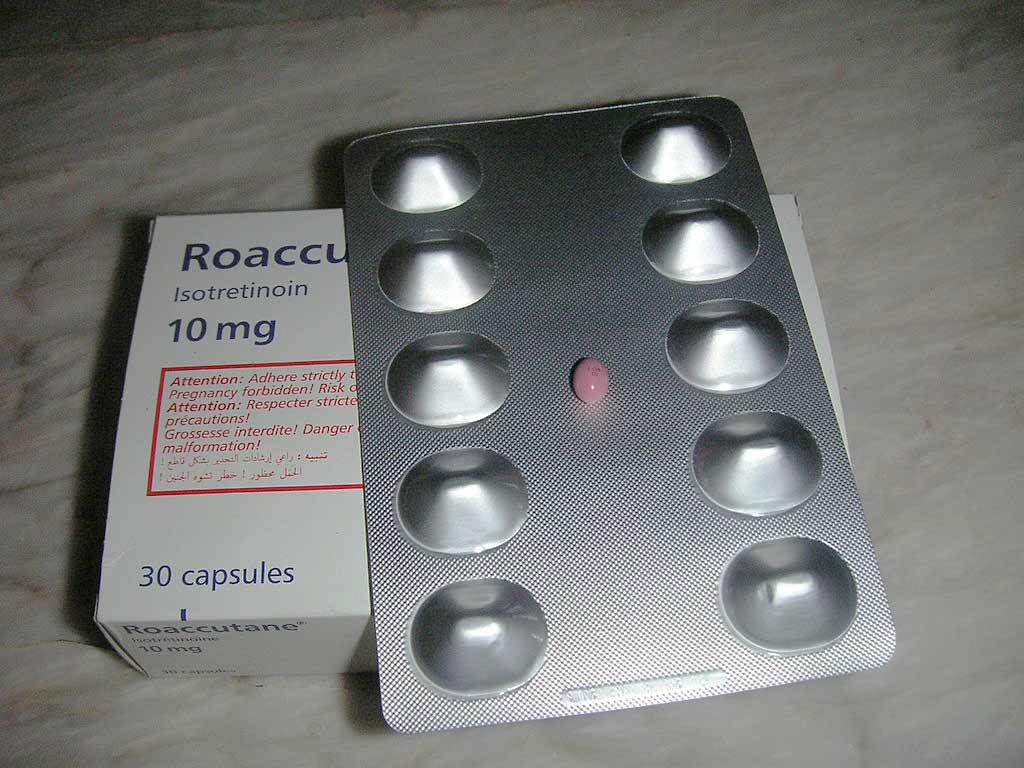New study unveils even more side-effects from Accutane. A Turkish study published just two months ago found that Accutane treatment increased systemic inflammation and reduces blood vitamin E levels.
In earlier posts I have talked about inflammation and the role it plays on acne. And as I’ve been reading research to update my book the role of inflammation in acne has become even more obvious. Local inflammation at the skin stimulates both sebocytes and keratinocytes. Sebocytes are the cells that produce sebum, while keratinocytes are the cells that produce keratin, the tough protein that binds cells together. Both sebum and keratin are elevated in acne patients, and this creates the ideal conditions for blocked pores. Many researchers now believe that inflammatory damage to sebum is what really triggers the acne formation process.
Systemic inflammation has a more indirect role in acne. We know that people with acne have higher levels of systemic inflammatory markers (such as lipid peroxidation products and immune system signaling molecules, cytokines). Comparing acne patients to people with clear skin we also find lower levels of vitamin E, C, A as well as other antioxidants. How does this affect acne? Nobody knows for sure yet, but the simplest explanation is that systemic inflammation depletes antioxidant levels, leaving fewer antioxidants to protect the sebum.
Two-way connection is also possible, and probably even likely. Acne-prone skin produces about 3 times more sebum than normal skin. This means it needs at least 3 times more antioxidant protection. So it’s possible that the skin just burns so many antioxidants that it depletes the body’s antioxidant reserves. And if something adds to the systemic inflammatory burden, such as gut issues, then even fewer antioxidants reach the skin, and this can aggravate acne.
So now that we are done with this little primer we can get back to this study, and why it’s results seem so weird. From other studies we know that Accutane treatment reduces sebum production and inflammation levels, and has many other beneficial effects for the skin. By all accounts this should reduce the inflammatory burden on the body.
 So the mind boggles to find out that Accutane actually increases systemic inflammation levels. Well, boggles is a strong word, and a game I really suck in. Perhaps Accutane just has some other systemic effects. This study hints of liver damage, something that has been known for some time. Perhaps Accutane has some effect on the liver antioxidant enzyme production.
So the mind boggles to find out that Accutane actually increases systemic inflammation levels. Well, boggles is a strong word, and a game I really suck in. Perhaps Accutane just has some other systemic effects. This study hints of liver damage, something that has been known for some time. Perhaps Accutane has some effect on the liver antioxidant enzyme production.
It’s hard to say what to make of this study. It’s just a pilot study and thus not very conclusive. It also doesn’t say anything about how long these effects persist. It seems the levels were measured shortly after the treatment in this study. Other studies show that severe abnormalities in liver function following Accutane treatment usually reverse over time. So it’s not my point to scare anyway away from Accutane, there’s already more than enough of that in the web.
Anyway, given the prominent role of inflammation in acne (and countless other chronic health problems), I would be careful with anything that causes more systemic inflammation. It may set the stage for later acne breakouts.
Cover image credit: WikiMedia.


I have been on accutane for 2 months now and I completely do feel as if my inflammation burden has been LOWERED. I tested my c reactive protein before I started and it was a little high… (as in just a notch into a flagged category). I’ll be interested to see what my c reactive protein is after I am done.
I would expect Accutane to lower inflammatory burden. Acne creates so much inflammation in the body that anything that reduces acne should also reduce inflammation. But human biology is very complex, so unexpected things happen regularly 🙂
Hi! 🙂 i read your acne history and noticed that you have taken accutane. I have a couple of questions on my mind and hopefully you have time to answer, i’d really appreciate it because I too have taken accutane and now i’m kinda scared of having done damage to my body. How old were you when you took accutane and how old are you now? Have you been healthy since taking it? based on your knowledge, do you think that accutane can cause any kind of long term damage or premature aging?( there are so many people on the internet speculating that) and don’t all medications cause at least some oxidative stress? and have you run into any studies about if accutane inhibits cellular proliferation even after discontinuation of treatment? and does accutane really destroy water holding molecules in the body?
Maria, I wrote a blog post to answer your questions. Please find it here: https://acneeinstein.com/accutane-side-effects-perspective/
How interesting. this could be a reason why some people get an ”initial breakout” on accutane. I’m currently on my 5th day and so far nothing has happened. I have been taking Vitamin E since reading this however. Dunno if that helps with anyhting.
The studies I’ve read say that the initial breakout from Accutane is caused by destruction of sebum producing skin glands. For some reason this can cause a temporary flare up in acne.
Ah, that’s interesting. I’ve actually never heard of that before. 😛